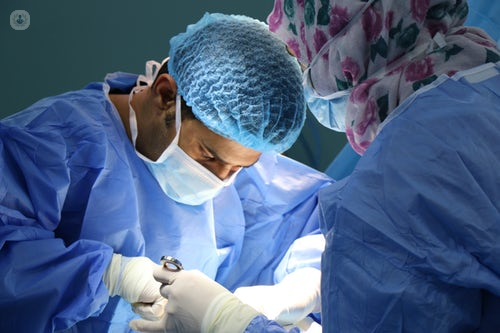What does an Ileal pouch or J-pouch surgery involve?
Written by:Ileal pouch surgery is mostly used to treat ulcerative colitis, or familial adenomatous polyposis (FAP) when removal of the colon and rectum is required but the patient wishes to avoid a permanent ileostomy. Colorectal surgeon, Mr Richard Lovegrove gives us a detailed guide about what an ileal pouch operation entails.

First, let's explain the difference between an ileostomy and ileal pouch surgery. An ileostomy creates a small opening at the end of the small intestine (ileum) to divert waste out through an opening in the abdomen and into a bag. The bag is worn outside the body. This is done when parts or all of the colon and rectum have been removed so waste can’t pass through the anus, as normal.
An ileal pouch is different to an ileostomy, in that a reservoir or pouch is made on the inside and waste is carried from the small intestine to the anus, without the need for a bag on the outside. Other names for ileal pouch surgery include restorative proctocolectomy, ileal pouch-anal anastomosis or a J-pouch.
An ileal pouch operation is commonly performed in a number of ways, with a two-stage operation and three stage operation being the most common. Let’s outline the different operations one by one.
One-stage
The whole of the colon and rectum are removed and the ileal pouch is created from the end of the small bowel. This is then joined to the top of the anal canal without the need for an ileostomy. It is rare for patients to have this done.
Two-stage
There are two variants to the two-stage operation:
One variant involves removing the colon, followed by an end ileostomy, which involves the end of the small intestine being brought out of the abdomen through a small cut where it’s stitched onto the skin to form what’s called a stoma. This is most commonly performed for a severe flare of colitis. Secondly, an operation is carried out to remove the rectum and the ileal pouch is created and joined to the top of the anal canal.
The second variation involves the total removal of the colon and rectum. The ileal pouch is then created and joined to the top of the anal canal in a single operation. A loop ileostomy is created upstream of the pouch. Then a second operation, typically three months later is carried out to close the ileostomy.
Three-stage
The three-stage operation involves one operation to remove the colon, followed by an end ileostomy. A second operation involves the removal of the rectum, creating the ileal pouch and joining it to the top of the anal canal with a loop ileostomy. The third operation is to close the ileostomy.
Life after surgery
Following ileal pouch surgery, the majority of patients report a good quality of life and are able to return to normal activities with few to no restrictions. There are international athletes, ultra-marathon runners and professional sportsmen who all have ileal pouches.
Bowel function with an ileal pouch won’t be the same, however, like that of someone who has a normal functioning colon and rectum. Most patients with an ileal pouch open their bowels five to seven times a day and may need to get up to go to the toilet during the night. Some patients experience urgency throughout the day and need to use the toilet in a hurry.
Up to half of the patients having a pouch for ulcerative colitis will experience pouchitis (inflammation within the pouch) at some point and this can feel like a flare of colitis. Most of the time this settles with a course of antibiotics.
While most patients are able to enjoy a good quality of life after getting an ileal pouch, there is always a risk of complications. Some patients may find that their pouch “fails” and they may need to resort to having an ileostomy or having the pouch removed.
Read more: life with a J-pouch
Are there alternatives?
An ileorectal anastomosis (re-joining the small bowel to the rectum), might be an option for patients where there is no longer evidence of inflammation within the rectum following removal of the colon. This surgery can achieve results similar to that of ileal pouch surgery. If, at a later stage, the rectum becomes inflamed and needs to be removed, an ileal pouch procedure can be undertaken.
On the other hand, if a patient is content with an ileostomy and doesn’t want the risks associated with an ileal pouch, the rectum and anus can be removed with a proctectomy, which is often used to treat rectal cancer. However, if a patient chooses to undergo a proctectomy, they cannot have an ileal pouch placed at a later stage, so it’s important that patients think carefully before undergoing this particular operation. It may, however, be possible to have a continent ileostomy or Kock pouch at a later stage.
If you’d like more information about the ileal pouch operation and how it works, visit Mr Richard Lovegrove’s Top Doctor’s profile for more information.


